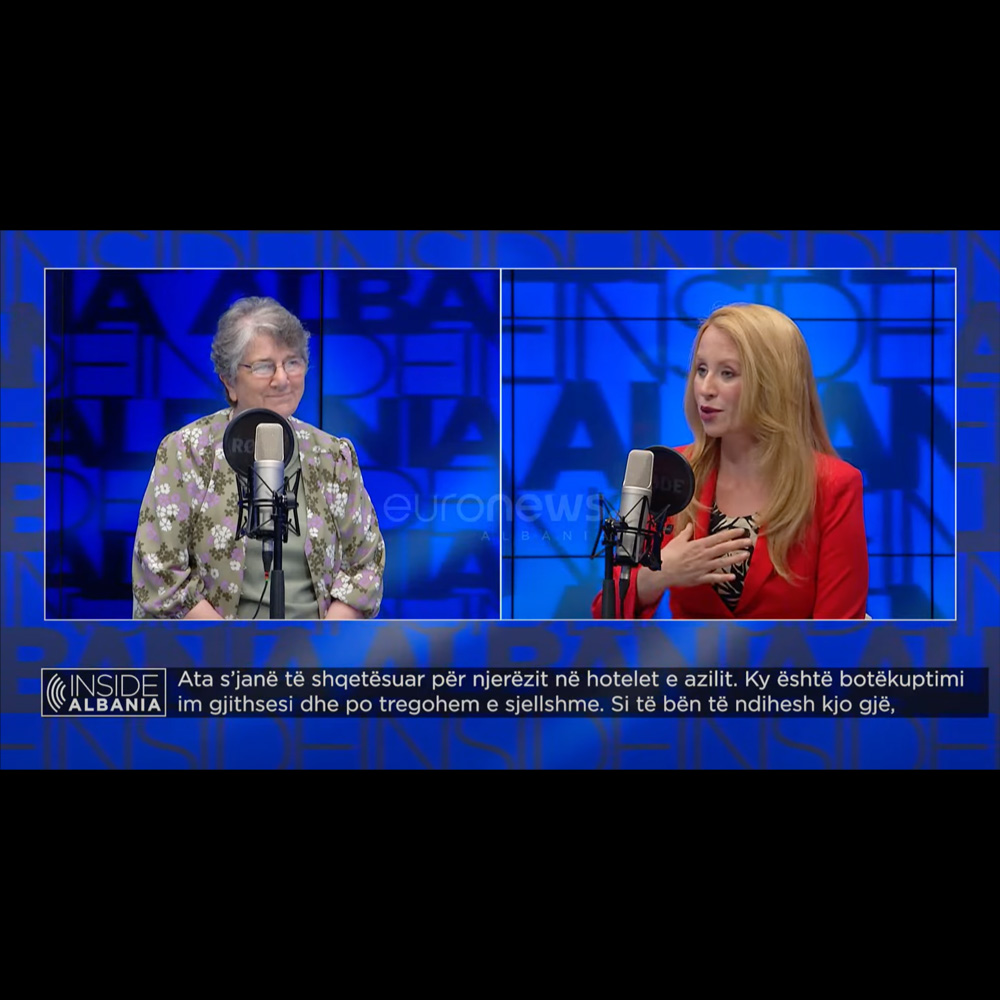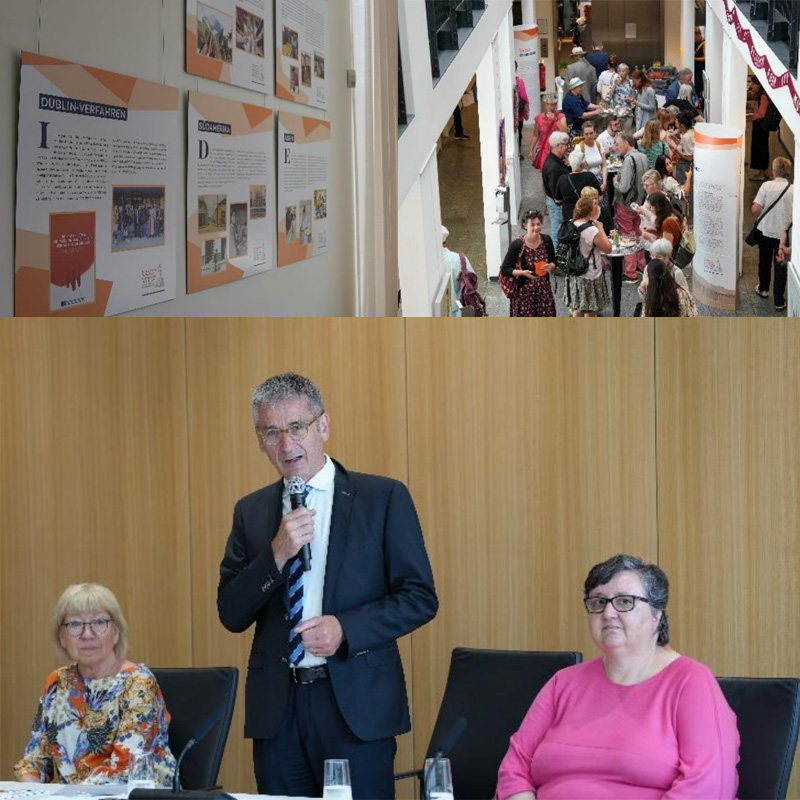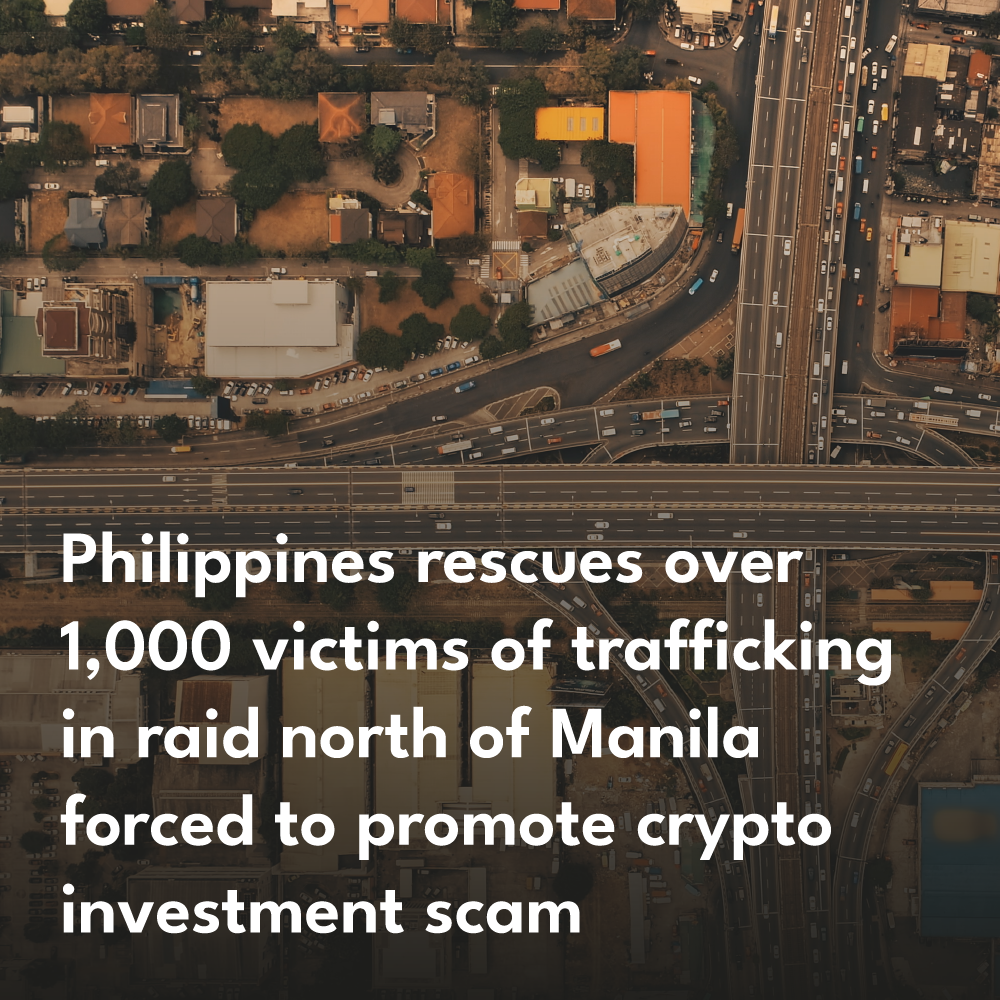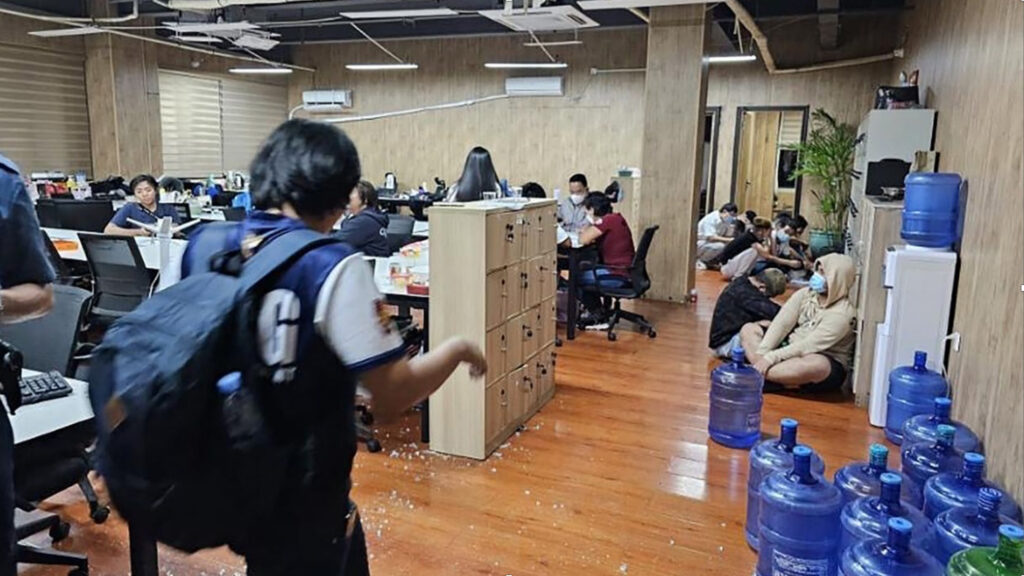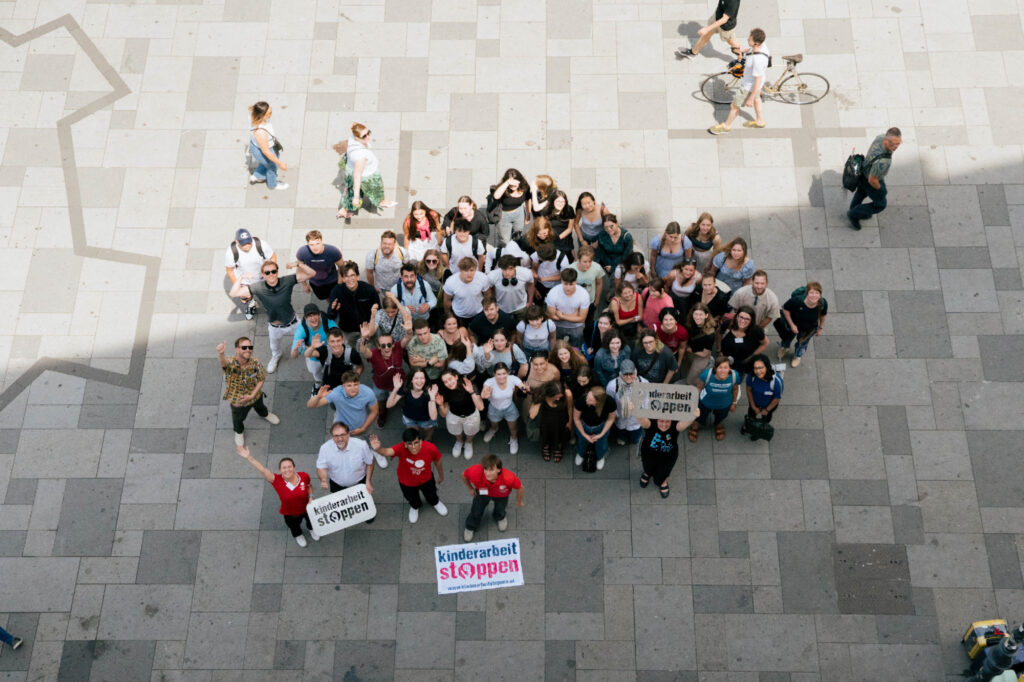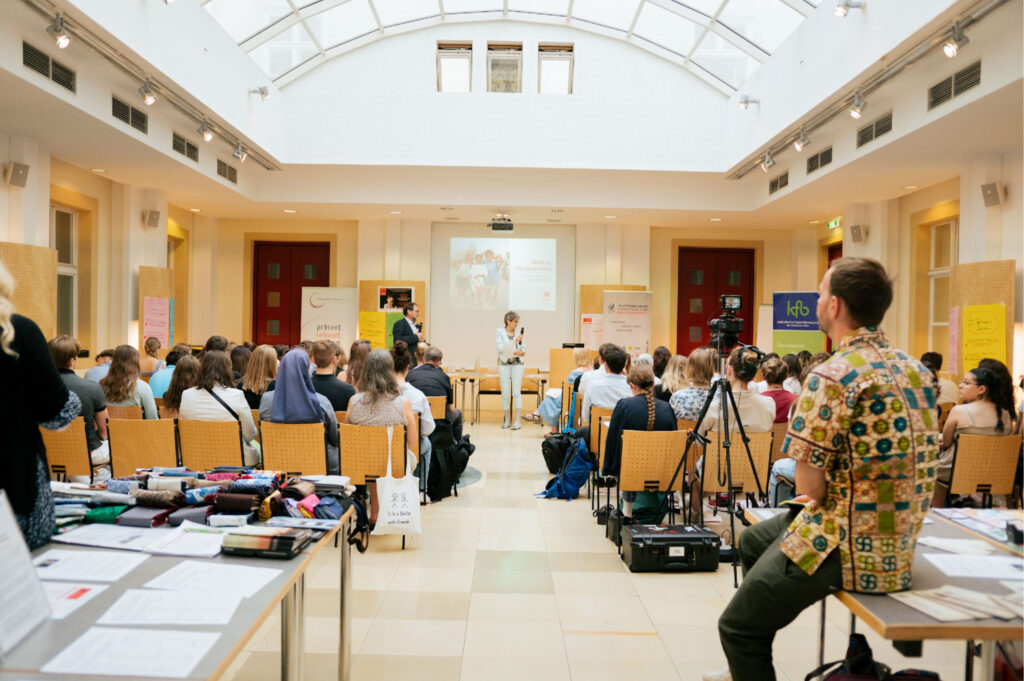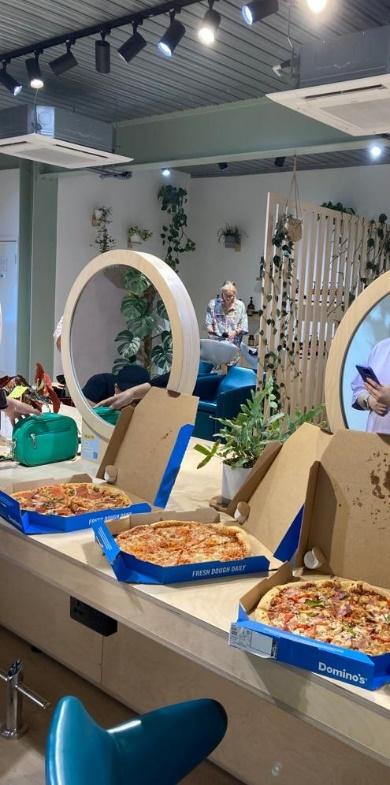Scroll for English translation
Liebe Freundinnen und Freunde, liebe Interessierte,
womöglich haben Sie bei diesem SOLWODI Aktuell das Gefühl eines Déjà-vus, denn es nicht einmal drei Monate her, dass unsere Ausstellung „Rückkehr in Würde. Chancen für ein selbstbestimmtes Leben“ in der Zitadelle Spandau mit einer inspirierenden Finissage erfolgreich zu Ende ging. Und doch berichten wir heute erneut von der Ausstellung, die nun – nach kurzer Unterbrechung – im Landtag Rheinland-Pfalz zu sehen ist.
Zur Vernissage am 21. Juni begrüßte Landtagspräsident Hendrik Hering die etwa 50 Gäste herzlich im Landtagsgebäude. Er betonte die Bedeutung des Rückkehrprogramms, zu dessen 30-jährigen Jubiläum die Ausstellung im vergangenen Jahr entstanden war. Dafür warf er auch einen Blick in die
Vergangenheit des Landesparlaments, das bereits in den 1990er Jahren erste Anträge zum Thema Migration und Integration
behandelt hatte.
Dr. Maria Decker, Vorsitzende von SOLWODI Deutschland e. V., stellte in ihrer Begrüßung die Schwierigkeiten und Herausforderungen heraus, mit denen Frauen konfrontiert sind, die sich für eine Rückkehr entscheiden. Neben Gewalterfahrungen und Traumata kann auch das Stigma „es nicht
geschafft zu haben“ einen Neuanfang im Herkunftsland erschweren. Maria Decker betonte besonders die Gefahr, wieder in den gleichen Kontexten zu landen, die zu einer Flucht oder Ausreise geführt haben.
Dieser tritt SOLWODI mit dem Rückkehr- und Reintegrationsprogramm und gemeinsam mit Partnerorganisationen aus rund 50 Ländern seit 30 Jahren entgegen. Für die umfassende Förderung und Unterstützung dieser Arbeit dankte Maria Decker dem Bundesministerium für wirtschaftliche
Zusammenarbeit (BMZ) und die Gesellschaft für Internationale
Zusammenarbeit (giz). Weiterhin galt ihr Dank den Mitarbeiterinnen des Programms, den Kolleginnen, die die Ausstellung geplant und umgesetzt haben und selbstverständlich dem Präsidenten sowie den Mitarbeiterinnen des Landtags Rheinland-Pfalz. Roshan Heiler, die als Vertreterin der giz ein Grußwort an die Anwesenden richtete, schloss sich dem Dank an. Zudem lobte sie die langjährige, gute Zusammenarbeit von SOLWODI und der giz, durch die vielen Frauen eine Rückkehr in Würde ermöglicht werden konnte. Zuletzt kam auch Gudrun Angelis als Kuratorin der Ausstellung zu Wort. Sie berichtete auf Basis ihrer langjährigen Erfahrung als Mitarbeiterin bei SOLWODI, wie herausfordernd die Rückkehr in das Herkunftsland für die Frauen sein kann. Sie müssten sich nicht nur in einer veränderten Umgebung neu Alle Fotos: Landtag Rheinland-Pfalz orientieren, sondern viele unterschiedliche Herausforderungen meistern. Umso wichtiger ist es, die persönlichen Geschichten, den Mut und das Durchhaltevermögen, aber auch Träume und Hoffnungen dieser Frauen zu beleuchten. Für die Möglichkeit, dies in der Ausstellung umsetzen zu können, dankte Gudrun Angelis den Rückkehrerinnen, die ihre Erfahrungen mit den Besucherinnen teilen. Ihr Dank
galt zugleich dem BMZ und der giz für die Förderung des Programms und der Ausstellung, dem Landtag
für die Möglichkeit, die Ausstellung in Mainz zeigen zu können, und natürlich den Mitarbeiterinnen des
Rückkehr- und Reintegrationsprogramms. Damit eröffnete Gudrun Angelis die Ausstellung.
Im Erdgeschoss des Landtagsgebäudes erwartet die Besucherinnen ein dokumentarischer Teil, der über politische und gesellschaftliche Auswirkungen auf das Programm sowie die Herausforderungen bei der Rückkehr informiert. Zudem kommen dort einige unserer Rückkehrerinnen zu Wort. 23 Frauen hatten uns erlaubt, ihren Rückkehrprozess anonymisiert in Form von Collagen zu veröffentlichen. Oft sind es nur kurze, einzeilige Momentaufnahmen oder Fotografien, die einen Einblick in ihre persönliche, aber auch in die politische Situation ihres Herkunftslandes geben. Beispielhaft berichteten Charlotte Becker, Jasmin Kelter und Aferdita Salihu aus dem Rückkehr- und Reintegrationsprogramm über einige Frauen, bevor die Gäste der Einladung ins Abgeordnetenhaus folgten. Dort erwartete sie nun der künstlerische Teil mit 37 Werken, für die sich die Künstlerinnen
mit vorab veröffentlichten und anonymisierten Lebensläufen
unserer Klientinnen beschäftigt hatten. Viele nutzten inmitten
dieser kunstvollen Stücke die Gelegenheit zu interessanten
Gesprächen über das Rückkehr- und Reintegrationsprogramm,
über die Herausforderungen angesichts der aktuellen politischen Entwicklungen und über die vielfältigen Kunstwerke. Zu
Gast waren auch vier der Künstlerinnen, die die Unterhaltungen sehr bereicherten.
Wir danken herzlich dem Landtag Rheinland-Pfalz für die Möglichkeit, die Ausstellung in den Räumlichkeiten in Mainz präsentieren zu dürfen. Ein großer Dank geht auch an den Landtagspräsident Hendrik Hering sowie seine Mitarbeiter*innen für die reibungslose Organisation und eine wunderbare Vernissage. Nicht zuletzt danken wir allen Gästen der Vernissage, die uns mit großem Interesse an unserer Arbeit und an der Ausstellung unterstützen.
Die Ausstellung „Rückkehr in Würde. Chancen für ein selbstbestimmtes Leben“ ist noch bis zum 14. Juli im Erdgeschoss des Deutschhauses (Platz der Mainzer Republik 1 in 55116 Mainz) sowie im Foyer des Abgeordnetengebäudes (Kaiser-Friedrich-Straße 3 in 55116 Mainz) von Montag bis Freitag in der Zeit von 8:00 bis 18:00 Uhr zu sehen. Sie können aus Sicherheitsgründen dazu aufgefordert werden, Ihren Personalausweis vorzuzeigen.
Wenn Sie die Arbeit von SOLWODI finanziell fördern wollen, können Sie das hier tun:
Kreissparkasse Rhein-Hunsrück
BIC: MALADE51SIM
IBAN: DE02 5605 1790 0001 1270 00
Wir möchten Sie wöchentlich mit „SOLWODI +++ Aktuell“ über Entwicklungen in unserer Arbeit informieren. Sie finden „SOLWODI +++ Aktuell“ auf unserer Homepage, können den Newsletter aber auch per E-Mail bestellen unter: info@solwodi.de
Mit freundlichen Grüßen
Dr. Maria Decker Barbara Wellner Sr. Paula Fiebag
Return in Dignity” – exhibition of the return program in the state parliament of Rhineland-Palatinate
Dear friends, Dear interested parties,
You may have the feeling of déjà vu with this SOLWODI news because it is not even three months ago, that our exhibition “Return in Dignity: Opportunities for a Self-Determined Life” in the Zitadelle Spandau came to a successful end with an inspiring vernissage. And yet, today we report again about the exhibition, which is now – after a short break – in the state parliament of Rhineland-Palatinate.
Welcomed to the vernissage on June 21st, State Parliament President Hendrik Hering stressed the importance of the return program, for its 30th anniversary. For that, he also took a look at the past of the state parliament’s first applications, as early as the 1990s, on migration and integration.
Dr Maria Decker, Chairwoman of SOLWODI Germany, introduced the difficulties and challenges faced by women applying to return. In addition to experiences of violence and trauma, the stigma “I cant make it” makes a new beginning in the country of origin more difficult. Maria Decker particularly emphasized the danger of ending up again in the same contexts that led to an escape or departure. This spurred on SOLWODI with their return and reintegration program, together with partner organizations from around 50 countries for 30 years. For the comprehensive promotion and support of this work, Maria Decker thanked the Federal Ministry for Economic Affairs Cooperation (BMZ) and the Society for International Cooperation (GIZ). She also thanked the employees of the program, and the colleagues who planned, ran, and implemented the exhibition. Lastly, she thanked the President and the staff of the state parliament Rhineland-Palatinate.
Roshan Heiler, who, as a representative of GIZ, said a word of welcome to the attendees, joined in the thanks. Roshan also praised the many years of good cooperation between SOLWODI and the GIZ, which enables many women to return with dignity. Most recently, Gudrun Angelis also came as curator of the exhibition. She reported on the basis of her many years of experience as an employee at SOLWODI, how challenging it is to return to the country of origin for the women. They would not only have to reinvent themselves in a changed environment orientation but master many different challenges. It is all the more important that personal stories, courage and perseverance, but also dreams and hopes are shared to illuminate these women. Gudrun Angelis thanked the returnees who shared their experiences with the visitors, and for the opportunity to implement these in the exhibition. Our thanks were also given to the BMZ and GIZ for funding the program and the exhibition, the state parliament for the opportunity to show the exhibition in Mainz, and of course the employees of thereturn and reintegration programme. With this, Gudrun Angelis opened the exhibition.
A documentary section awaits visitors on the ground floor of the state parliament building about political and social effects on the program and the challenges informed upon return. In addition, some of our returnees have their say there. 23 women allowed us to publish their return process anonymously in the form of collages. Often they are just short, single-line snapshots or photographs that provide an insight into their personal, but also in the political situation of their country of origin.
Charlotte Becker, Jasmin Kelter and Aferdita Salihu from the Return and Reintegration program spoke about some women before the guests of the invitation to the House of Representatives followed.
Amongst the guests were also four of the artists who greatly enriched the conversations.
We would like to thank the Landtag of Rhineland-Palatinate for the opportunity to present the exhibition in the present premises in Mainz. A big thank you also goes to the President of the Landtag Hendrik Hering and his staff for the smooth organization and a wonderful vernissage. Last but not least, we would like to thank all the guests at the vernissage, who showed great interest in our support, our work and the exhibition.
The exhibition “Return with Dignity. Opportunities for a self-determined life” is still available until 14th July on the ground floor of the Deutschhaus (Platz der Mainzer Republik 1 in 55116 Mainz) and in the foyer of the House of Representatives (Kaiser-Friedrich-Straße 3 in 55116 Mainz) from Monday to Friday.
Viewing time is from 8:00 a.m. to 6:00 p.m. For security reasons, you may be asked to show your identity card.
If you want to support the work of SOLWODI financially, you can do so here:
Kreissparkasse Rhein-Hunsrück
BIC: MALADE51SIM
IBAN: DE02 5605 1790 0001 1270 00
We would like to inform you weekly about developments in our work with “SOLWODI +++ Aktuell”.
inform. You will find “SOLWODI +++ Aktuell” on our homepage, but you can still subscribe to the newsletter
also order by email at: info@solwodi.de
Best regards
Dr. Maria Decker, Barbara Wellner, and Sr. Paula Fiebag

.png)





